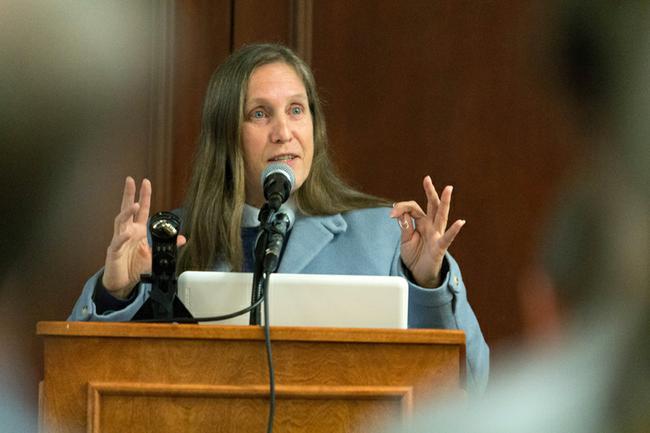Professor David Holben discussed the idea of food insecurity and health outcomes Thursday afternoon in front of a full house in Stotler Lounge.
Holben, a professor of nutrition at Ohio University, cited multiple studies and personal research to make his point, but said that a T-shirt his students made gets the idea across.
“It says, ‘An apple a day,’ and we’re thinking, ‘An apple a day keeps the doctor away,’” Holden said, laughing. “But an apple a day … still leaves you two to three servings of fruit shy of what you should be eating.’”
Holben was one of many speakers participating in the national symposium, “Food Insecurity: Assessing Disparities, Consequences and Policies,” hosted by the College of Agriculture, Food and Natural Resources. The symposium focuses on the causes, possible solutions and repercussions of hunger in America. It began on Wednesday and will end Friday in Memorial Union.
An MU news release said researchers from across the country will “meet with staff from the USDA, the Food Research and Action Center, and community program initiatives.” The release emphasized that food insecurity will be a major focus of the talks.
“The summit is designed to be a dialogue between people who work with food insecurity directly and researchers who can use information from the food insecurity workers to create better research models,” the release stated.
MU spokesman Randy Mertens said the symposium is, among other things, “appropriate.”
“It’s really appropriate for a university engaged in the research that it does into agriculture, food, sociology, culture and such to bring all of these elements together to discuss and create partnerships to better understand the problem and inform solutions,” Mertens said.
Mertens, who works closely with the CAFNR program, said MU has a national and international reputation in the fields discussed in the symposium. He said the university looked for speakers who could bring “value, expertise and a deep knowledge of the subject” to the various panels and discussions.
“(The goal was) to create an atmosphere where the problems and solutions can be discussed in a holistic way — in a way that all of the various factors affecting food and security in America can be discussed and a robust set of solutions can be created,” Mertens said.
Holben, a keynote speaker on Thursday, presented many potential solutions to food insecurity in the U.S. His presentation urged educators to include the concept in their programs. It also emphasized screening patients and clients for food access information and stressed the increasing importance of safety net programs.
Holben also pointed to the audience as a part of the solution.
“I think what we’re doing here today is a great start,” Holben said. “Because if we can all sit down together and learn about food insecurity, and physicians can sit down and learn about food insecurity, and nurses are talking about food insecurity and other healthcare professionals are, then we can move this movement along.”
Mertens said collaboration is key to the symposium.
“I think (the) intent was to bring these people together and have a discussion on new ideas, new ways to proceed, that really can only come when you bring people together in the same room and you create a dialogue between them,” Mertens said.








